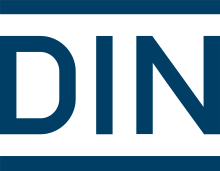

Deutsches Institut für Normung e.V. (DIN; in English, the German Institute for Standardisation) is the German national organization for standardization and is the German ISO member body. DIN is a German Registered Association (e.V.) headquartered in Berlin. There are currently around thirty thousand DIN Standards, covering nearly every field of technology.
YouTube Encyclopedic
-
1/3Views:6511 26611 092
-
101 Dinge DIN Deutsches Institute für Normung
-
Deutsches Institut für Normung
-
Wozu gibt's DIN-Normen? - Gut zu wissen | DIN | ISO
Transcription
History
Founded in 1917 as the Normenausschuß der deutschen Industrie (NADI, "Standardisation Committee of German Industry"), the NADI was renamed Deutscher Normenausschuß (DNA, "German Standardisation Committee") in 1926 to reflect that the organization now dealt with standardization issues in many fields; viz., not just for industrial products. In 1975 it was renamed again to Deutsches Institut für Normung, or 'DIN' and is recognised by the German government as the official national-standards body, representing German interests at the international and European levels.
The acronym, 'DIN' is often incorrectly expanded as Deutsche Industrienorm ("German Industry Standard"). This is largely due to the historic origin of the DIN as "NADI". The NADI indeed published their standards as DI-Norm (Deutsche Industrienorm). For example, the first published standard was 'DI-Norm 1' (about tapered pins) in 1918. Many people still mistakenly associate DIN with the old DI-Norm naming convention.
One of the earliest, and probably the best known, is DIN 476 — the standard that introduced the A-series paper sizes in 1922 — adopted in 1975 as International Standard ISO 216. Common examples in modern technology include DIN and mini-DIN connectors for electronics, and the DIN rail.
DIN SPEC 3105, published in 2020, is "the first German standard to be published under an open license (CC-BY-SA 4.0) [...] to implement an open standardisation process".[1]
DIN standard designation
The designation of a DIN standard shows its origin (# denotes a number):
- DIN # is used for German standards with primarily domestic significance or designed as a first step toward international status. E DIN # is a draft standard and DIN V # is a preliminary standard.
- DIN EN # is used for the German edition of European standards.
- DIN ISO # is used for the German edition of ISO standards.
- DIN EN ISO # is used if the standard has also been adopted as a European standard.
Examples of DIN standards
- DIN 476: international paper sizes (now ISO 216 or DIN EN ISO 216)
- DIN 1451: typeface used by German railways and on traffic signs
- DIN 31635: transliteration of the Arabic language
- DIN 41612: mechanical standard for backplane electrical connection
- DIN 72552: electric terminal numbers in automobiles
See also
- Austrian Standards International
- Swiss Association for Standardization
- Die Brücke, an earlier German institute aiming to set standard paper sizes
- DIN film speed
- DIN connector
- Scuba: DIN connection, DIN connectors
- DQS - Deutsche Gesellschaft zur Zertifizierung von Managementsystemen, a subsidiary of DIN
- DGQ - Deutsche Gesellschaft für Qualität, founded DQS in 1985 together with DIN
- ^ Bonvoisin, Jérémy; Molloy, Jenny; Haeuer, Martin; Wenzel, Tobias (2020-04-15). "Standardisation of Practices in Open Source Hardware". Journal of Open Hardware. 4. arXiv:2004.07143. doi:10.5334/joh.22. S2CID 215768760.
External links
- DIN home page (German version)
- DIN home page (English version)
- Guidance paper Archived 2022-03-18 at the Wayback Machine (in German)
- Further education (in German)
- Web Courses (official education partner) (in German)
- Safety instructions (official DIN education partner) (in German)
- Training for engineers, managers and experts (official education partner) (in German)
- International Organization for Standardization (ISO)
